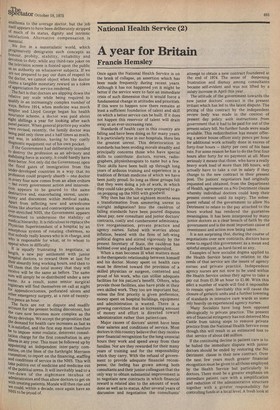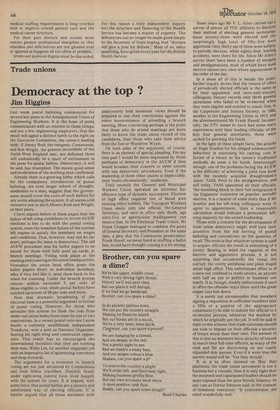National Health Service (2)
A year for Britain
Francis Hemsley
Once again the National Health Service is on the brink of collapse, an assertion which has been made frequently during recent years. Although it has not happened yet it might be better if the service were to face an immediate crisis of such dimension that it would force a fundamental change in attitudes and priorities. If this were to happen now there remains at least a sufficient foundation of talent and skill on which a better service can be built. If it does not happen this reservoir of talent will drain away at an ever-increasing rate.
Standards of health care in this country are falling and have been doing so for many years. It is particularly true in our hospitals. Here lies the greatest unrest. This deterioration in standards has been eroding morale steadily and principally concerns those who have special skills to contribute: doctors, nurses, radiographers, physiotherapists to name but a few. Their skills have been built up through long years of arduous training and experience in a tradition of British medicine of which we have been justly proud.So long as these groups felt that they were doing a job of work, in which they could take pride, they were prepared to go on propping up the NHS with goodwill.
Why then has the last eighteen months seen a transformation from simmering unrest to outright indignation? Into the cauldron of falling standards have been poured disputes about pay, new consultant and junior doctors' contracts, costly and cumbersome administrative reorganisation, private practice and agency nurses. Salted with worries about inflation, heated with the fires of left-wing political dogma and stirred vigorously by the present Secretary of State, the cauldron has bubbled over and goodwill has evaporated.
When a man becomes ill what matters most is the therapeutic relationship between himself and his doctor. Money spent on health care must be directed toward the provision of a skilled physician or surgeon, contented and, proud of his work, who can utilise adequate facilities for his patient's benefit. Others, who provide those facilities, also have pride in their own skilled work. They too are important but, unless the first priority is given preference, money spent on hospital buildings, equipment and administration is wasted. There is a growing conviction that an increasing amount of money and effort is directed toward administration rather than patienecare.
Major causes of doctors' unrest have been their salaries and conditions of service. Most doctors in this country believe that they receive poor financial recognition for the long unsocial hours they work and spend away from their families. Nor are they rewarded for their many years of training and for the responsibility which they carry. With the refusal of government to provide adequate financial recompense, the feeling has grown among both consultants and their junior colleagues that the only way to obtain substantial improvement is to negotiate new contracts in which financial reward is related also to the amount of work done as well as to status. After several years of discussion and negotiation the consultants' attempt to obtain a new contract foundered at the end of 1974. The sense of deepening frustration and dismay among consultants became self-evident and was not lifted by a salary increase in April this year.
The attitude of the government towards the new junior doctors' contract is the present irritant which has led to the latest dispute. The pricing of this contract by the independent review body was made in the context of' present day policy with instructions from government that it had to be paid for out of the present salary bill. No further funds were made available. This redistribution has meant offering a senior house officer sixty pence per hour for additional work actually done in excess of forty-four hours — thirty per cent of his base rate. For some reason he has to do the first four hours after forty for no payment at all. More seriously it means that those, who have a really heavy work load of more than 105 hours, will actually have to take a cut in salary if they change to the new contract in their present post. The juniors' negotiators had originally requested and obtained, from the Department of Health, agreement on a No Detriment clause whereby individual doctors could keep their present contract until its expiry. The subsequent refusal of the government to allow No Detriment to relate to the pay attached to the hours worked has rendered the guarantee meaningless. It has been interpreted by many junior doctors as a clear breach of faith by the government and is the most important cause of resentment and action now being taken.
It is not surprising that, during the course of negotiations over new contracts, doctors have come to regard this government as a mean and spiteful employer, as hard-faced as any.
Examples of how socialist dogma applied to the Health Service bears no relation to the needs of that service are the issues of agency nurses and private practice. Independent agency nurses are not now to be used within the Health Service unless they agree to take a pay cut from £1.50 an hour to £1.00. With this edict a number of wards will find it impossible to remain open. Inevitably this will cause the closure of geriatric units and a further lowering of standards in intensive care wards as some rely heavily on experienced agency nurses.
Many Socialists have long been opposed ideologically to private practice. The present era of financial stringency has not deterred Mrs Castle from taking steps to remove private practice from the National Health Service even though this will result in an estimated loss to that service of about £40 million.
If the continuing decline in patient care is to be halted the immediate dispute with junior doctors should be ended by restoring the No Detriment clause in their new contract. Over the next few years much greater financial recognition must be given to all those employed by the Health Service but particularly to doctors. There must be a greater emphasis on immediate patient care with a simplification and reduction of the administrative structure together with a greater responsibility for controlling funds at a local level. A fresh look at medical staffing requirements is long overdue both to improve overall patient care and the medical career structure.
For their part doctors and nurses must restore greater professional discipline so that mistakes and deficiencies are not glossed over or ignored as happens all too often at present.
Irrelevant political dogma must be discarded. For this reason a truly independent inquiry into the structure and financing of the Health Service has become a matter of urgency. The deficiencies can no longer be made good simply by the Secretary of State hoping that "doctors will give a year for Britain." Most of us, since qualifying, have given every year for the British Health Service.



































 Previous page
Previous page